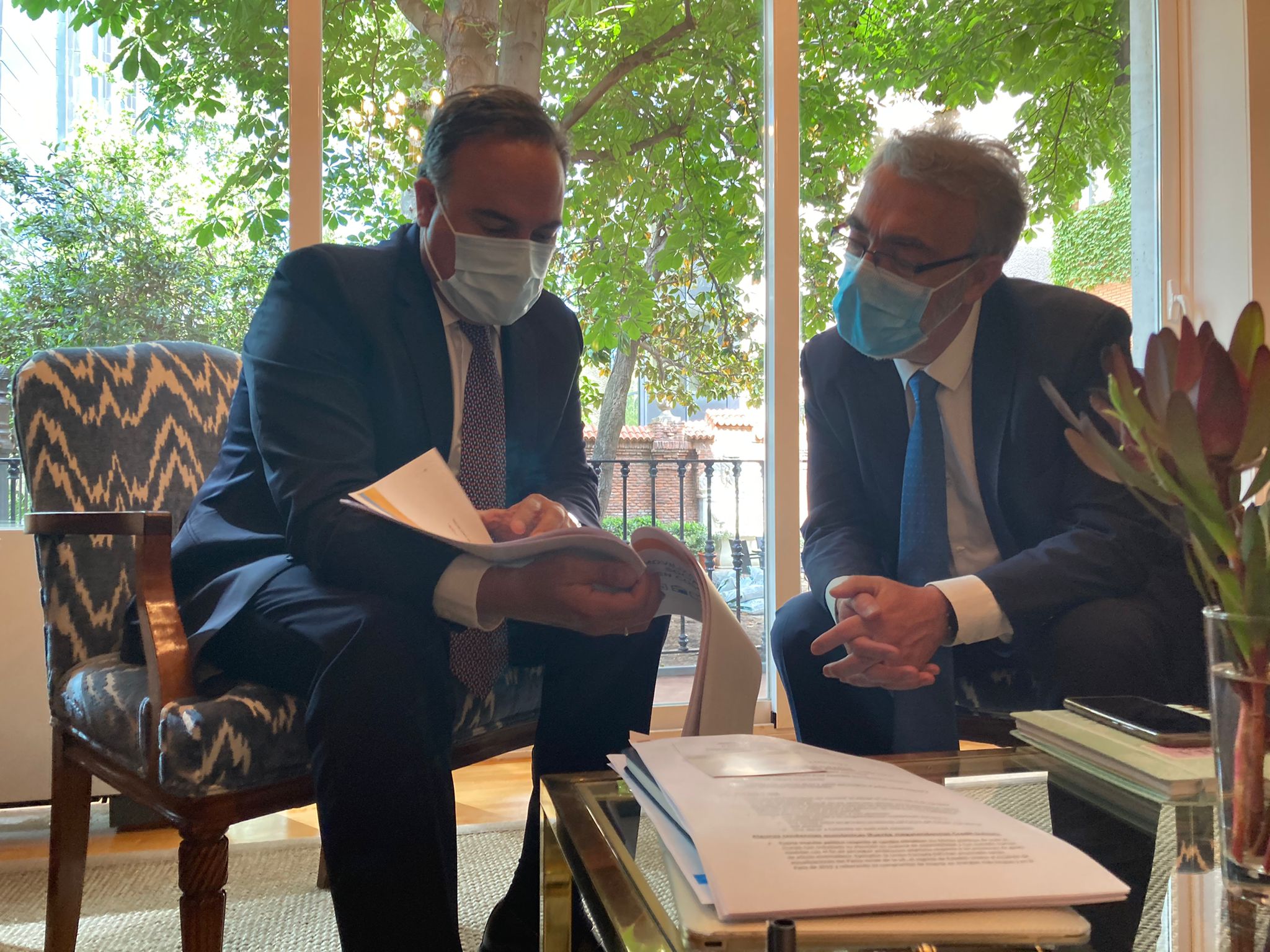Luis Guillermo Plata
Embajador de Colombia
Juan David Latorre y Javier Socastro
During an interview at the embassy for The Diplomat in Spain’s YouTube channel, the Colombian ambassador, Luis Guillermo Plata, declared that the protests in his country “have been an opportunity for groups with obscure interests” and assures that “if you go from protesting to vandalism, the forces of public order have to intervene”.
It is clear that Colombia is catching international attention with all the events that are happening. What do you have to say, Mr. Ambassador?
Well thank you very much for this time to be able to talk with you. It is very important to be able to explain the context of what is happening in Colombia.
What triggered all this was a failed tax reform that was presented approximately two weeks ago with a very specific purpose. Basically, to be able to sustain the expenses caused by the pandemic, to be able to maintain a “solidarity income” for people who need it the most, to be able to give that economic support to poor families, to be able support small businesses, to be able to maintain payroll subsidies and also, of course, the expense of the entire vaccination plan.
In Colombia, we have got very high expenses, as they have had in most of the world, so there is a general need to generate additional income.
Perhaps this reform was poorly explained, or it probably lacked agreement with other political parties. However, the issue here is that it had to be withdrawn because it generated a negative reaction. I think it was not understood well and that is why people went out to march.
Nonetheless, the question now is: if the tax reform has already been withdrawn, why are they still marching? There are many explanations. On the one hand, logically there are groups that have diverse interests, from indigenous, to interest groups, minorities… But it has also been an opportunity for other groups with dark interests. That is, groups on the fringes of the law with the intention of generating chaos, anarchy… And as they say in Colombia: “fishing in a troubled river.”
In Colombia, protesting is a right. We are a democracy. Anyone who feels the need to protest can do so as long as the law is respected, and other people’s rights are respected. Unfortunately, during these days of protests, 5,569 activities have taken place between concentrations, marches, mobilizations and blockades. Things have been changing rapidly, and although not in all cases, things have turned into violence and vandalism. That is something that the state cannot allow.
Just to give you an idea, in these days 2,757 acts of vandalism have been carried out in the national territory. What does that mean in actual numbers? Attacks on government infrastructure: 79. Cultural monuments destroyed: 14. Public infrastructure, attacks on tolls, traffic lights cameras: 190. 1,052 public transport vehicles that have been incinerated in some cases. 156 transport stations, 87 service stations, and 828 entities of the banking sector with damages of some kind. So, there is much more here than a protest.
Peaceful protest is allowed and is protected by the Constitution. But what cannot happen is all this. There have even been roadblocks that have had a tremendous impact on the food-scarce population and where oxygen had to be transported for patients to different locations, causing major dramatic consequences. So, I want to make it clear that what is happening in Colombia goes beyond a protest. And of course, in that case the forces of public order must intervene.
There are many complaints that we are a repressive state and that the police are indiscriminately attacking protesters. But I want to leave you some figures that are important. We have 449 police officers injured in these days of protest, of which there are 53 women. 714 attacks against the police have been with blunt elements, 99 with sharp short weapons, 19 with explosives and 12 with firearms. So, don’t tell me that whoever is going to march in a peaceful protest and who has a gun in his pocket is peaceful because it is nonsense.
Now of course, there are also wounded on the other side, and sadly there are dead. And I believe that death is not possible to justify in any way. But you do have to understand that the public force has had to act.
Do you think that the forces of order in Colombia are used to having a more forceful attitude due to having fought against a much stronger enemy, such as the FARC? On the other hand, President Iván Duque has called for the largest deployment of public force in Cali. What force does he mean?
Colombia has a very well-trained army and a very well-trained police force because it has had to fight against criminality, against the guerrillas, drug trafficking… But the role of each one is very clear.
The army is a war force, and it is used for that. The police is a civilian force. And within the police there is a specialized group called ESMAD, the Mobile Anti-Riot Squad, which is trained in these matters, and whose weapons are the so-called “less lethal weapons”. The ESMAD uses this type of weapon precisely to avoid causing harm to people. However, it can also be deadly like any other object used incorrectly.
Last time I checked, there were 28 dead. But it is important to bear in mind that not all of those 28 deaths are attributable to past marches. So far, it has been determined that 9 of them are not for reasons related to the march, and there are 7 cases that are under investigation.
Now, it is also important to say that at this moment there are 55 investigations underway and that, if any police officer exceeded and crossed the line, they will have to be judged to the fullest extent of the law. As well as the other people who have also attacked the police.
So, what do you think motivates so many people to take to the streets, even knowing that the streets are more dangerous than ever? How does it relate to the 2019 protests, prior to the difficulties caused by COVID?
It is true, this is not an isolated case in the region. We had demonstrations in 2019, but also Chile and Ecuador had them.
I believe that there is a part of the protest, and a significant number of people, who are marching for legitimate reasons, and that is fine.
What cannot happen is people doing this type of excess, where clearly there are other types of interests.
Isn’t it contradictory how the tax reform was born with a focus on protecting the population and that it has resulted in so much lack of protection?
Yes, it is completely contradictory. In fact, if you review the requests of the organizers of the strike, they are asking for many of the things for which the tax reform had been created.
They are asking for a solidarity income for the neediest people, they are asking for subsidies for SMEs, they are asking for increases in vaccination…
The question is: where does that money come from? Because last time I checked money still wasn’t “growing from trees”. Colombia will need to get funds from somewhere. And if they tell you that you cannot privatize state companies… The country’s debt capacity is already reaching its limit, and the income has to come from somewhere to be able to make this type of transfer to those who need it most.
So, yes, there is a great deal of irony here. Because curiously, this list of applications contains many of the elements that were intended to be covered by the tax reform.
Do you think that everything that is happening could influence the relations that Colombia has with other countries and specifically with Spain?
We are having an excellent time with Spain. Just before I came to Spain, I was receiving Minister González Laya in Colombia. She came to see exactly how Colombia was on the immigration issue. She personally traveled to Cucutá to see it through her own eyes.
Spain has given us tremendous support on issues of support for the migration of the Venezuelan population that is in Colombia. Currently, 1.8 million migrants. Spain led the donor conference. Spain has supported the temporary statute for the protection of migrants that we have recently implemented. I think that has been fundamental.It is important that they also have a vision of the other side.
It is important to have all the information from all the different points of view to understand a problem that is not simple, and that today is even more complex due to the distortion that occurs in social networks, where the news is immediate, where you react without thinking, where you don’t know what fake news is. Where they recirculate videos from 5 years ago and put them as if they were those of today… They are things that are impossible to discern.
So, it is important to have all the information and I personally like numbers. I try to analyze the numbers and take them from official sources in order to have a more precise appreciation of what is happening.







